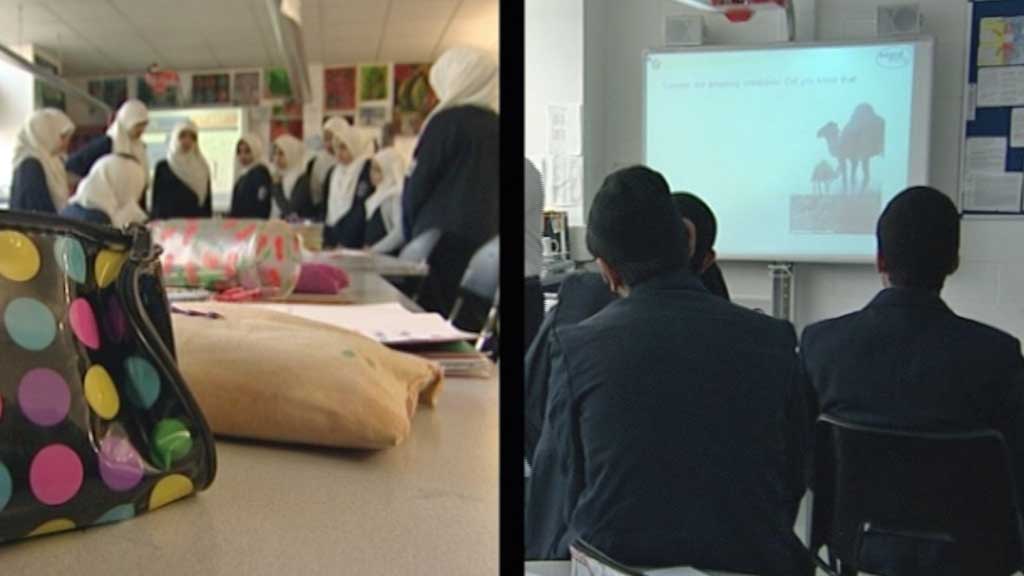Divided by faith: inside the segregated Madani schools
 Darshna Soni
Communities Editor
Darshna Soni
Communities Editor
Home Affairs Correspondent Darshna Soni gains exclusive access to the Madani Federation in Leicester criticised for gender segregation in school.

It’s a warm, sunny afternoon and a group of year 11 boys are revising for a science exam. There’s nothing unusual about the lesson – except that, unlike in mainstream single-sex schools, these students will never be allowed to be taught by a woman.
Their school in Leicester recently caused controversy when it advertised for a new science teacher – but stated that only men need apply.
It caused an uproar and the school found itself in the headlines, accused of segregation and flouting the Equalities Act.
Our religion does not permit us to break the law of the land we live in. Hussein Suleman, chair of governors
Michael Gove, the education secretary, asked Leicester City Council to put pressure on the school to withdraw the advert.
Until now, the school has never spoken, but we were given exclusive access. In his only interview, the chair of governors, Hussein Suleman, told me they have done nothing wrong.
“There’s an exemption in the Equalities Act for faith schools, and we’ve been advised that we haven’t broken the law. In fact, our religion does not permit us to break the law of the land we live in,” he said.
Mr Suleman invited me to look around and I spent the day filming lessons. The Madani Federation runs two – very separate – schools on one site, a boys’ and a girls’ secondary.
Segregated teachers
The school says that in accordance with its religious ethos, boys and girls are segregated – but so too are the teachers. Although the students share some facilities, the school day is staggered so that they never meet, with the girls starting 15 minutes earlier.
There’s even a separate timetable for the shared library, with girls and boys only being allowed access on separate days.
“We don’t believe it would be right for males to teach our female pupils, or for a woman to teach our young men. In our religion, men and women do not interact on a casual basis, there are dos and don’ts and rules of conduct,” said Mr Suleman.
But are these rules compatible with modern Britain, for a school funded by the taxpayer? Like many faith schools, Madani is voluntary-aided, which means it is partly state-funded but has the freedom to run its own affairs.
“Islam is absolutely compatible with modern Britain,” Mr Suleman told me. “And it is something our parents want and something our pupils want.”
The Equality Act
The Equality Act (2010) was intended to simplify the law by bringing together existing anti-discrimination legislation. After lobbying by various religious communities, the following exemption was incorporated for faith schools: in very limited circumstances the Equality Act permits faith schools to take into account religious considerations in employment. If an employer, including an education establishment, wants to restrict a post by gender, they would need to show that it is an occupational requirement for the post.
Islamic ethos
The school is certainly popular, with a long waiting list. Many of the parents I spoke to said they specifically chose it because of its Islamic ethos.
“I wouldn’t feel comfortable if my daughter had a male teacher,” one mum told me.
“It wouldn’t be right in a Muslim school. This is my religious belief. I should have the freedom to choose.”
But are these religious freedoms compatible with the law? The Department of Education thinks not. Michael Gove asked officials at Leicester City Council to visit the school, to remind it that it must comply with the Equality Act.
But the school denies that it was forced to remove the ad. Legalities aside, there’s a wider question – are these students being adequately prepared for the world outside?
Some within the Muslim community think not.
There is nothing in my religion which states that a woman cannot teach men. And what message are we sending to these boys? Sara Khan
“There is nothing in my religion which states that a woman cannot teach men. And what message are we sending to these boys, that only a man can teach them science?” said Sara Khan, who runs a Muslim Women’s project called Inspire.
She is against gender segregation: “We don’t stand in segregated queues at the supermarket or at the bus stop. What are we teaching our children if we enforce it in schools?”
I asked some of the children of Madani High themselves. I asked to interview a mixed group of boys and girls, but only the girls were available.
“I just feel more comfortable with female teachers,” one girl told me. “We can be ourselves around women.”
“It’s not like we’re in school 24/7, so we do mix with boys outside of school. When I go to the shop, I talk to the male shopkeeper and I feel comfortable, I don’t feel like I’m doing anything wrong,” her friend told me.
All of the girls were extremely positive about the school. The girls’ secondary recently performed better in an Ofsted inspection than the boys’ school, which was judged as needing improvement.
One of the reasons for its poor rating was its reliance on temporary staff. The school told me it has a plan in place to recruit more teachers, but that it will continue to do so in accordance with its religious beliefs.
-
Latest news
-
Boy with profound learning disabilities reaches out of court settlement after abuse in residential school7m

-
India election: Modi rivals hit by string of raids and arrests7m

-
Can UK’s abandoned mines be used to build a greener future?5m

-
Sycamore Gap: Man pleads not guilty to felling iconic tree2m

-
‘Child poverty has not fallen since Tories came in’, says Gordon Brown5m

-




